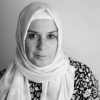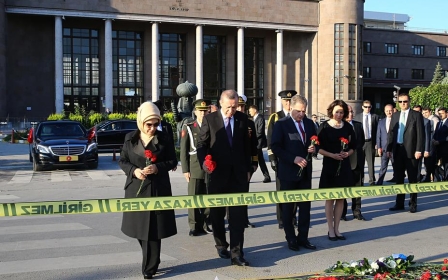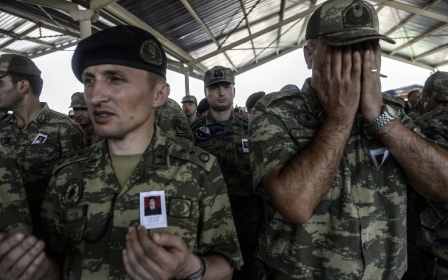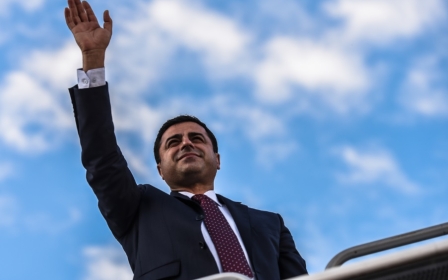Lasting peace is necessary for democracy to thrive in Turkey
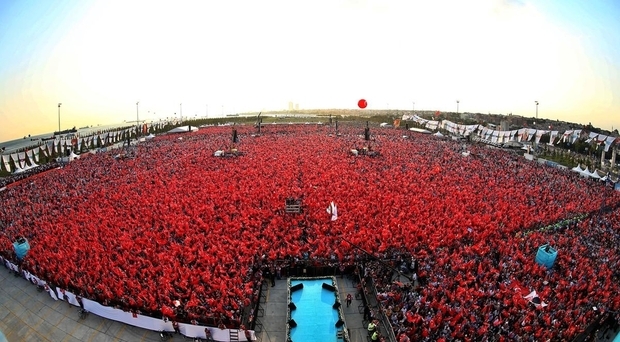
The majority of Turks have a firm belief in democracy. A recent survey of Turkish public opinion by Pew Research Center found that 56 percent prefer a democratic form of government to one in which there is a strong leader. However, are a strong leader and a democratic form of government mutually exclusive? Can democracy survive, or indeed, thrive, under a strong leader?
There have been many strong leaders in the history of the Turkish Republic, starting with Ataturk, the founder of the Republic. However, other leaders who have sought to democratise Turkey have often had their efforts nipped in the bud by military coups. Turkey’s modern history is littered with five military coups in as many decades. In fact, a competitive and open democratic system in Turkey is a fairly recent phenomenon – the army lifted a ban on forming political parties only in 1983.
Turgut Ozal, prime minister from 1983 to 1989 and president from 1989 to 1993, led a social and economic transformation that opened the country and brought wide benefits, particularly to poorer regions. He put particular emphasis on individual rights as opposed to the dominant nationalist Kemalist approach, which gave the state priority; Ozal insisted that, “The people are not the servants of the state, but the state must be servant of the people.” Ozal died suddenly during his term, and an exhumation in 2012 found evidence of poisoning. A trial implicating a former army general is ongoing.
It was Turgut Ozal who first launched negotiations with the Kurdistan Workers Party (PKK) and lifted a ban on speaking Kurdish in public in 1991. However, it was not until 2012 that the Kurdish language was finally recognised and taught in schools, that bans on media broadcasts in Kurdish were lifted, and institutes of Kurdology were established at universities.
It may sound absurd to Western ears that for decades the use of certain Kurdish letters was prohibited by the Turkish state. When I moved to Turkey in the 1990s people were still hiding their Kurdish identities. Primary school children would use the word “Kurd” as an insult. I have friends who grew up not learning their mother tongue because their parents did not want them to be penalised for being Kurdish.
Despite the horrific attacks in Ankara last week, we need to recognise that there has been huge progress in Turkey, with rights being extended to all sections of the population over the last decade. The elimination of discriminatory bans against Kurds has helped Turkish society to finally become more inclusive; now there is a clear shift in mentality from being “Turks”, defined by a rigid nationalistic identity, to being equal citizens of the Turkish Republic.
For the first time in decades, Turks have finally enjoyed an end to the constant threat of military coups, economic growth, stability and democratic reforms that broadened participation. The ban that had excluded women who wear the headscarf – who make up over 50% of the female population, according to NGO estimates - from participating in the public sphere and politics was finally lifted. In addition, the government lifted a ban on political campaigning in languages and dialects other than Turkish, and launched high-level diplomatic talks with Armenia, seeking rapprochement after decades of rancour.
However, democracy in any country always suffers in times of conflict – in the case of Turkey, a conflict raging since 1984 and triggered by a separationist movement, the PKK, who are seeking a separate state for the Kurdish population.
For nearly two years after the launch of negotiations with the PKK in 2013, no lives were lost in terrorist attacks in Turkey. This summer the talks came to a very violent halt, and the peace was broken. Peace talks are rarely easy or straightforward; one need only look at the peace talks between the British government and the Irish Republican Army. Former British prime minister Tony Blair (who, like President Erdogan, was in power for three terms) tried to keep the peace talks going; in the end it was only when the Americans sat down at the table with the other parties that the Good Friday agreement could be brokered.
In the face of multiple challenges, internal and external, Turkey needs both democracy and strong leadership. At a time in which certain political forces are trying to drive polarization and take us further away from a renewed peace process, it is important to remember that dialogue is the only way towards lasting peace. Conflicts that rage for decades only polarize society; eventually both sides have to come to the table and talk face to face. This is what successive peace processes from around the world have shown us, such as the negotiations now between the government and rebel movements in Colombia.
The Turkish nation will choose its leader on 1 November; whomever this may be, they must have the strength and resolve to show the Turkish people that greater democracy, stability and prosperity can be achieved only through renewed peace negotiations and inclusive dialogue. It is this lasting peace that is necessary for democracy to thrive in Turkey.
-Zeynep Jane Louise Kandur is a commentator on Turkish affairs and board member of Justice and Development Party's (AKP) Istanbul Branch.
The views expressed in this article belong to the author and do not necessarily reflect the editorial policy of Middle East Eye.
Photo: More than one hundred thousand Turks attend an anti-terror rally in Istanbul on 20 September 2015 (AA).
New MEE newsletter: Jerusalem Dispatch
Sign up to get the latest insights and analysis on Israel-Palestine, alongside Turkey Unpacked and other MEE newsletters
Middle East Eye delivers independent and unrivalled coverage and analysis of the Middle East, North Africa and beyond. To learn more about republishing this content and the associated fees, please fill out this form. More about MEE can be found here.


